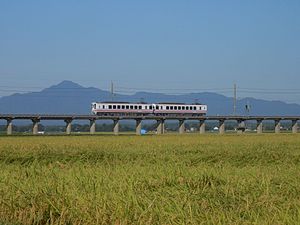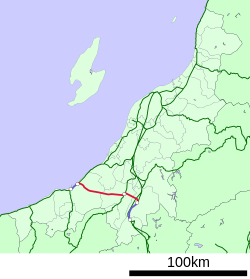Hokuhoku Line
This article may be expanded with text translated from the corresponding article in Japanese. (October 2018) Click [show] for important translation instructions.
|
| Hokuhoku Line | |||
|---|---|---|---|
 | |||
| Overview | |||
| Owner | Hokuetsu Express | ||
| Locale | Niigata Prefecture | ||
| Termini | |||
| Stations | 12 | ||
| Service | |||
| Operator(s) | Hokuetsu Express | ||
| History | |||
| Opened | 22 March 1997 | ||
| Technical | |||
| Line length | 59.5 km (37.0 mi) | ||
| Track gauge | 1,067 mm (3 ft 6 in) | ||
| Electrification | 1,500 V DC overhead catenary | ||
| Operating speed | 130 km/h (80 mph) | ||
| |||
The Hokuhoku Line (ほくほく線, Hokuhoku-sen) is a Japanese railway line in Niigata Prefecture that runs from Muikamachi in Minamiuonuma City to Saigata in Jōetsu City. It is the sole railway line operated by Hokuetsu Express (北越急行, Hokuetsu Kyūkō). Construction of the line first began in 1968 by the Japanese National Railways (JNR), and was initially referred to as the Hokuetsu-Kita Line (北越北線, Hokuetsu-kita-sen). However, the construction of the line was plagued by numerous delays, and was finally completed as a third sector line on 23 March 1997, including the 10,472 m (6.5 mi) Akakura Tunnel, the longest on a non-JR line.
Unlike most other third sector company lines, the Hokuhoku Line made steady profits after its opening, as the former Hakutaka Limited Express train service, which travelled using the line, served as the principal link between the Tokyo metropolitan area and the Hokuriku region until the opening of the Hokuriku Shinkansen in 2015. The line's former maximum speed limit of 160 km/h (100 mph) allowed the Hakutaka to become the fastest narrow gauge train service in the country, matched only by the standard gauge Keisei Skyliner services to Narita International Airport as the fastest non-Shinkansen service (also at 160 km/h); however, following the withdrawal of Hakutaka services on the line on 14 March 2015, the maximum speed limit of the line was reduced to 130 km/h (80 mph).[1]
Services
Originally, the line acted as a connecting route to the Jōetsu Shinkansen at Echigo-Yuzawa Station. Upon the opening of the Hokuriku Shinkansen on 14 March 2015, the limited express services Hakutaka[2][3] of the line, which had run from 1997 with an average daily ridership of 6,900 passengers, were withdrawn.[4] Since then, a daily special rapid service Snow Rabbit has been served, instead of Hakutaka.
Trains from Muikamachi are described as down-bound, whereas those from Saigata are described as up-bound.
Local Service
16 return trips are operating each day, including one up-bound through service from Arai of the Myōkōhaneuma Line. Some trains running on Sundays are designated as Yumezora, in which movies will be played when the trains are going through a tunnel. Since the discontinuation of Hakutaka in 2015, required trip time is reduced by 10 minutes. Through-trains to and from JR Lines do not stop at some stations of the Jōetsu Line and Shin'etsu Main Line.
Rapid Service
Two down-bound and three up-bound trains are operating each day between Echigo-Yuzawa and Naoetsu.
Chō-Rapid Service - Snow Rabbit (スノーラビット)
Two down-bound and one up-bound trains are operating each day, and one of the down-bound train runs through to Arai of the Myōkōhaneuma Line. The fastest service, which stops only at Tōkamachi, only takes 57 minutes travelling from Echigo-Yuzawa to Naoetsu.
Chō-Slow Service - Snow Turtle (スノータートル)
Snow Turtle is a special service with irregular schedules and available for rental by organizations. Being a comical counterpart of Snow Rabbit, the trains run at a very low speed, as slow as 10 km/h, to give passengers a chance to experience winds while opening the side doors of the trains. Meals are also provided during the four-hour journey.
Passing loops
There are three passing loops on the Hokuhoku Line. Each has one bi-directional through track to allow full line speed.
Akakura
Between Uonumakyūryō and Misashima in Tōkamachi, Niigata. It is in the 10472m Akakura tunnel.
Yakushitōge
Between Tōkamachi and Matsudai in Tōkamachi, Niigata. It is in the 6199m Yakushitōge tunnel.
Gimyō
Between Matsudai and Hokuhoku-Ōshima in Tōkamachi, Niigata. It is in the 9130m Nabetachiyama tunnel(ja:鍋立山トンネル).
Gallery
Open-floor viaduct near Kubiki Station
Rolling Stock
- 12 HK100 series - For Local, Rapid and Chō-Rapid
9 HK100-0 series train sets were built by Niigata Transys for use on local, rapid and Chō-Rapid Snow Rabbit trains between Echigo-Yuzawa and Naoetsu, and started operation since its opening in 1997. Having a maximum speed of 110 km/h operating on the 160 km/h lines, this trains feature a fast acceleration of 3.0 km/h/s to minimize disruptions of Hakutaka train services. 1 permanent 2-car sets known as HK100-100 series entered service in 2003, and 4 cars were refurbished for the Yumezora video projection train.
Interior of HK100 Yumezora while going through a tunnel.
Video projections are displayed on the ceiling on Sundays and holidays.[5]
Former
- 681-2000 series - Hakutaka
- 683-8000 series - Hakutaka
18 cars of 681-2000 series and 9 cars of 683-8000 series trains, nicknamed Snow Rabbit Express (SRE) were built by Kawasaki Heavy Industries, with final assembly at Niigata Transys for operation on the Hakutaka limited express trains between Echigo-Yuzawa and Kanazawa stations. At a operating speed of 160 km/h, this was the fastest train in the country to run on narrow gauge. Following the retirement of the Hakutaka services, the trains were transferred to JR West for operation on Shirasagi limited express services.
Stations
The Hokuhoku line is entirely in Niigata Prefecture.
- Service patterns:
- ● All trains stop
- ○ Some trains stop
- | All trains pass
- * Seasonal stop
- Track:
- ∥: Double-track section
- ∧: Double-track section begins
- ∨: Double-track section ends
- |: Single-track section
- ◇: Passing loop
| Line | Name | Distance | Local | Rapid | Chō- Rapid |
Transfers | Track | Location | |
|---|---|---|---|---|---|---|---|---|---|
| Jōetsu Line | Echigo-Yuzawa | 越後湯沢 | 17.6 | ● | ● | ● | JR East: ■ Jōetsu Line (for Minakami) |
∥ | Yuzawa |
| Ishiuchi | 石打 | 11.2 | | | | | | | ∥ | Minamiuonuma | ||
| Ōsawa | 大沢 | 7.2 | | | | | | | ∥ | |||
| Jōetsu International Skiing Ground | 上越国際スキー場前 | 6.2 | * | * | | | ∥ | |||
| Shiozawa | 塩沢 | 3.9 | ○ | ○ | | | ∥ | |||
| Muikamachi | 六日町 | 0.0 | ● | ● | ○ | JR East: ■ Jōetsu Line (for Urasa) | ∨ | ||
| Hokuhoku Line | Uonuma-Kyūryō | 魚沼丘陵 | 3.6 | ● | | | | | | | ||
| Misashima | 美佐島 | 12.2 | ● | | | | | | | Tōkamachi | ||
| Shinza | しんざ | 14.4 | ● | | | | | | | |||
| Tōkamachi | 十日町 | 15.9 | ● | ● | ● | JR East: ■ Iiyama Line | ◇ | ||
| Matsudai | まつだい | 29.2 | ● | ● | ○ | ◇ | |||
| Hokuhoku-Ōshima | ほくほく大島 | 38.6 | ● | ● | | | | | Jōetsu | ||
| Mushigawa-Ōsugi | 虫川大杉 | 44.8 | ● | ● | ○ | ◇ | |||
| Uragawara | うらがわら | 46.8 | ● | ● | | | | | |||
| Ōike-Ikoi-no-mori | 大池いこいの森 | 51.7 | ○ | | | | | | | |||
| Kubiki | くびき | 53.6 | ● | ● | | | ◇ | |||
| Shin'etsu Main Line | Saigata | 犀潟 | 59.5 | ● | ● | | | JR East: ■ Shin'etsu Main Line {for Niigata) | ∧ | |
| Kuroi | 黒井 | 63.9 | ○ | ○ | | | ∥ | |||
| Naoetsu | 直江津 | 66.6 | ● | ● | ● | Echigo Tokimeki Railway: ■ Nihonkai Hisui Line, ■ Myōkō Haneuma Line | ∥ | ||
See also
- List of railway companies in Japan
- List of railway lines in Japan
- Densha de Go! - a Japanese series of train simulation games, some of which featured the line
- Shareholders[6]
- Niigata Prefecture - 54.8%
- Joetsu, Niigata - 13.2%
- Tokamachi, Niigata - 11.9%
- Echigo Kotsu - 2.2%[7]
References
- ^ Itō, Kumi. Transformation underwent at Hokuetsu Express, Railway Fan, Issue 670, Kōyūsha, February 2017, p. 68-73.
- ^ "Archived copy" (PDF). hokuhoku-line.jp. Archived from the original (PDF) on 16 May 2013. Retrieved 12 January 2022.
{{cite web}}: CS1 maint: archived copy as title (link) - ^ "Archived copy" (PDF). hokuhoku-line.jp. Archived from the original (PDF) on 16 May 2013. Retrieved 12 January 2022.
{{cite web}}: CS1 maint: archived copy as title (link) - ^ "Archived copy" (PDF). www.hokuhoku.co.jp. Archived from the original (PDF) on 27 August 2014. Retrieved 12 January 2022.
{{cite web}}: CS1 maint: archived copy as title (link) - ^ "Trains". Hokuetsu Express Co.,Ltd. Retrieved 2020-07-18.
- ^ About shareholders
- ^ About making an investment in Hokuetsu Express
This article also incorporates material from the corresponding article in the Japanese Wikipedia
External links
- Hokuetsu Express official website (in Japanese)
- Hokuetsu Express official website (in English)
BoilerPlate was here
- CS1 maint: archived copy as title
- Articles with short description
- Featured articles needing translation from Japanese Wikipedia
- Transport articles needing translation from Japanese Wikipedia
- Articles containing Japanese-language text
- Official website not in Wikidata
- Articles with Japanese-language sources (ja)
- Railway lines in Japan
- Rail transport in Niigata Prefecture
- 1067 mm gauge railways in Japan
- Railway lines opened in 1997
- Japanese third-sector railway lines











![Interior of HK100 Yumezora while going through a tunnel. Video projections are displayed on the ceiling on Sundays and holidays.[5]](https://upload.wikimedia.org/wikipedia/commons/thumb/b/b0/HK100_100_yumezora_roof.jpg/120px-HK100_100_yumezora_roof.jpg)

